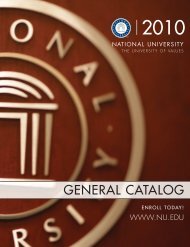Journal of Research in Innovative Teaching - National University
Journal of Research in Innovative Teaching - National University
Journal of Research in Innovative Teaching - National University
Create successful ePaper yourself
Turn your PDF publications into a flip-book with our unique Google optimized e-Paper software.
Conclusion<br />
SL learn<strong>in</strong>g must be a two-way process, like a two-way ma<strong>in</strong>tenance bil<strong>in</strong>gual education model<br />
that requires a SL to be developed simultaneously with ma<strong>in</strong>ta<strong>in</strong><strong>in</strong>g the first language for all non-<br />
English speak<strong>in</strong>g students. So, <strong>in</strong> promot<strong>in</strong>g bil<strong>in</strong>gualism, society has to be fair and support SL<br />
learn<strong>in</strong>g not only for immigrants but also for the local population. Unfortunately, this is not the<br />
case, because it is <strong>of</strong>ten <strong>in</strong>fluenced by political factors. A society can be peaceful, successful, and<br />
equitable to its members only if it is balanced. Any imbalance, whether caused un<strong>in</strong>tentionally or<br />
deliberately, when dictated by special group <strong>in</strong>terests, leads to the societal imbalance that<br />
immediately creates a tension due to the shift <strong>of</strong> equilibrium and dooms any promis<strong>in</strong>g<br />
progressive <strong>in</strong>itiatives. This must be understood by the governments and by all cultural groups<br />
co-exist<strong>in</strong>g <strong>in</strong> a nation and must be expla<strong>in</strong>ed to all members <strong>of</strong> the society. No one can reap a<br />
benefit at the expense <strong>of</strong> others for a long time; eventually, it will be revoked.<br />
Therefore we can identify four major goals <strong>in</strong> atta<strong>in</strong><strong>in</strong>g national balanced bil<strong>in</strong>gualism:<br />
• The concept <strong>of</strong> balanced, symmetrical bil<strong>in</strong>gualism and bil<strong>in</strong>gual education for all<br />
citizens has to be accepted and become a part <strong>of</strong> the national social order.<br />
• Schools need to adopt effective <strong>in</strong>structional methodologies and technologies that ensure<br />
fast and productive SL and FL development.<br />
• The efforts to use exist<strong>in</strong>g <strong>in</strong>novative approaches or design more advanced ones should<br />
be enhanced.<br />
• To implement new learn<strong>in</strong>g models, teachers capable <strong>of</strong> produc<strong>in</strong>g tangible outcomes<br />
ought to be prepared. This can be done by updat<strong>in</strong>g exist<strong>in</strong>g teacher preparation<br />
programs, <strong>in</strong>tegrat<strong>in</strong>g <strong>in</strong> them effective FL methodologies, and <strong>of</strong>fer<strong>in</strong>g pr<strong>of</strong>essional<br />
development events conducted by experts <strong>in</strong> <strong>in</strong>novative learn<strong>in</strong>g.<br />
Integration <strong>of</strong> the pr<strong>in</strong>ciples and practical recommendations presented here may help<br />
improve SL learn<strong>in</strong>g outcomes and reduce the time for develop<strong>in</strong>g pr<strong>of</strong>iciency, thus produc<strong>in</strong>g<br />
both educational and economic effects while help<strong>in</strong>g to more expeditiously <strong>in</strong>tegrate immigrants<br />
<strong>in</strong>to society. This would significantly benefit social and <strong>in</strong>tercultural relationships with<strong>in</strong> the<br />
nation.<br />
References<br />
Abu-Rabia, S. (1999). Attitudes and psychol<strong>in</strong>guistic aspects <strong>of</strong> first language ma<strong>in</strong>tenance among Russian-Jewish<br />
immigrants <strong>in</strong> Israel. Educational Psychology: An International <strong>Journal</strong> <strong>of</strong> Experimental Educational<br />
Psychology, 19(2), 133–148.<br />
Arnesen, A., Hadzhitheodoulou-Loizidou, Bîrzéa, P., Essomba, C., Angel, M., & Julie, A. (2009). Policies and<br />
practices for teach<strong>in</strong>g sociocultural diversity: Concepts, pr<strong>in</strong>ciples and challenges <strong>in</strong> teacher education.<br />
Council <strong>of</strong> Europe Publish<strong>in</strong>g, Strasbourg Cedex, France.<br />
Bennett, M. (1998). Basic concepts <strong>of</strong> <strong>in</strong>tercultural communication. Boston: Intercultural Press.<br />
Bernhardt, E. (1998) Sociohistorical perspectives on language teach<strong>in</strong>g <strong>in</strong> the modern United States. In H. Byrnes<br />
(Ed.), Learn<strong>in</strong>g foreign and SLs: Perspectives <strong>in</strong> research and scholarship. New York: The Modern Language<br />
Association <strong>of</strong> America.<br />
Chomksy, N. (1968). Language and m<strong>in</strong>d. New York: Harcourt Brace Jovanovich.<br />
Cumm<strong>in</strong>s, J. (1981). Biliteracy, language pr<strong>of</strong>iciency, and educational programs. In J. R. Edwards (Ed.), The social<br />
psychology <strong>of</strong> read<strong>in</strong>g (pp. 131–146). Silver Spr<strong>in</strong>g, MD: Institute <strong>of</strong> Modern Languages. Cumm<strong>in</strong>s, J. (2001).<br />
Negotiat<strong>in</strong>g identities: Education for empowerment <strong>in</strong> a diverse society (2nd ed.). Los Angeles: California<br />
Association for Bil<strong>in</strong>gual Education.<br />
133

















